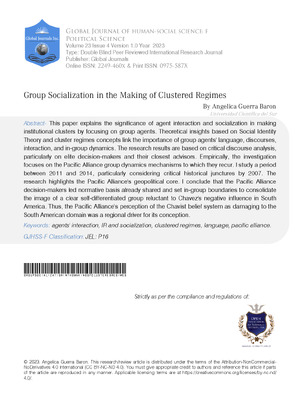Group Socialization in the Making of Clustered Regimes
Keywords:
agents' interaction, IR and socialization, clustered regimes, language, pacific alliance
Abstract
This paper explains the significance of agent interaction and socialization in making institutional clusters by focusing on group agents Theoretical insights based on Social Identity Theory and cluster regimes concepts link the importance of group agents language discourses interaction and in-group dynamics The research results are based on critical discourse analysis particularly on elite decision-makers and their closest advisors Empirically the investigation focuses on the Pacific Alliance group dynamics mechanisms to which they recur I study a period between 2011 and 2014 particularly considering critical historical junctures by 2007 The research highlights the Pacific Alliance s geopolitical core I conclude that the Pacific Alliance decision-makers led normative basis already shared and set in-group boundaries to consolidate the image of a clear self-differentiated group reluctant to Chavez s negative influence in South America Thus the Pacific Alliance s perception of the Chavist belief system as damaging to the South American domain was a regional driver for its conception
Downloads
How to Cite
References

Published
2023-10-04
Issue
Section
License
Copyright (c) 2023 Authors and Global Journals Private Limited

This work is licensed under a Creative Commons Attribution 4.0 International License.